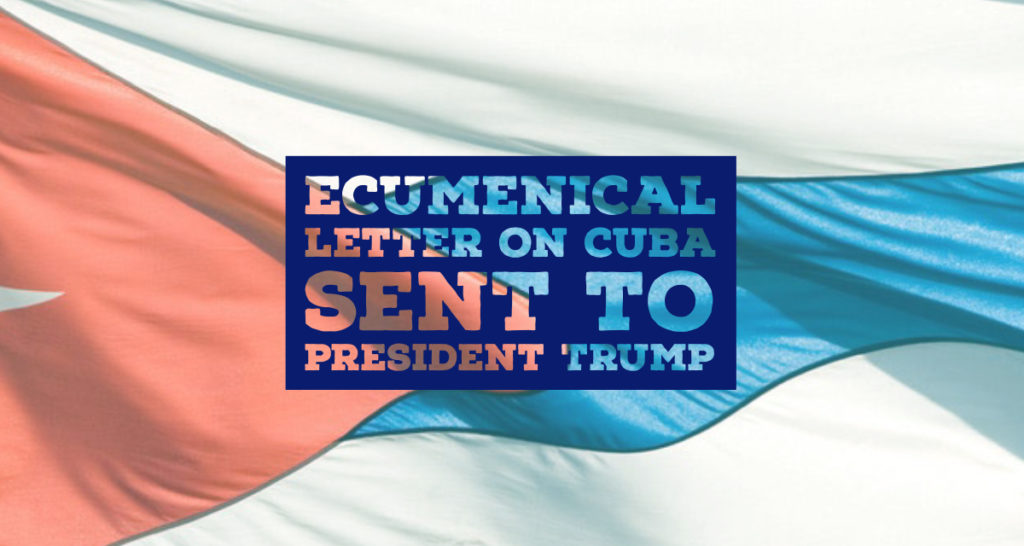Ecumenical Letter on Cuba Sent to President Trump
January 10, 2019
President Donald J. Trump
The White House
Washington, DC 20500
Dear Mr. President:
As religious institutions and faith-based humanitarian aid organizations with long-standing ties to Cuban faith communities and people, we write with great concern about changes in U.S. policy toward Cuba under consideration by your Administration. There is no doubt that these changes, if they occur, will badly harm ordinary Cubans.
The already existing decision to limit consular services to U.S. citizens and residents and compel Cubans applying for non-immigrant visas who wish to visit family, or engage in religious, scientific, academic or cultural exchanges with the United States to travel elsewhere to apply has negative effects. This action makes it impossible for many Cubans to visit the United States. Because of limited financial resources, many are unable to travel to neighboring countries to apply for visas. This undue hardship means that many Cuban pastors will be unable to attend religious conferences in the United States, and, even more lamentably, ordinary Cubans will not be able to visit family members.
The decision to suspend, and now permanently close the Havana field office of US Citizenship and Immigration Services, will have a major impact on Cubans seeking to emigrate to the United States, and will likely make it impossible for the United States to comply with its obligation, in force since the 1994 migration agreement, to issue 20,000 immigrant visas a year.
We understand that the Administration is also considering not renewing the presidential waiver that blocks law suits against foreign investors in Cuba from proceeding under Title III of the Helms Burton Act. Allowing these suits to go forward will have a chilling effect on foreign investment in Cuba by U.S. allies and to some extent U.S. businesses. In addition to harming North American and European commercial interests, of special humanitarian concern to us is that ordinary Cubans will lose job opportunities and see their hopes for economic advancement erode. It is not acceptable to punish ordinary Cubans over our policy disagreements with the Cuban government. We urge you to renew this waiver.
We also ask you not to place additional restrictions on travel to Cuba. Travel by Cuban-Americans to visit family members, religious travel, travel as part of academic programs, and educational-cultural opportunities under general licenses mutually benefit the peoples of both countries. Regular and extensive contact between Americans and Cubans increases our understanding of our neighbor and helps create a more open Cuban society.
Finally, we note that placing Cuba again on the State Department’s list of State Sponsors of Terrorism would be unjustified, undermine U.S. standing with allies, and not help ordinary Cubans.
We urge you to move forward, not backward, toward an overall improvement in the U.S.-Cuba relationship. More amicable U.S.-Cuban ties advance American goals and is a major factor in Cuban progress toward a society and economy more beneficial for the Cuban people. Attempts to isolate Cuba will have the opposite effects.
On behalf of our members in the United States and partner religious institutions in Cuba, we thank you for your consideration of these concerns.
Alliance of Baptists
American Baptist Home Mission Societies
Church World Service
Disciples Center for Public Witness (Disciples of Christ)
Evangelical Lutheran Church in America
Franciscan Action Network
Global Ministries of the Christian Church (Disciples of Christ) and the United Church of Christ
Latin America Working Group
Maryknoll Office for Global Concerns
Missionary Oblates of Mary Immaculate – United States Province
National Advocacy Center of the Sisters of the Good Shepherd.
National Council of Churches USA
Office of Social Justice, Christian Reformed Church in North America
Presbyterian Church (USA)
United Church of Christ, Justice and Witness Ministries
United Methodist Church, Board of Church and Society
Cc: Secretary Pompeo, Secretary of State
Mauricio Claver-Carone, Special Assistant to the President and Senior Director,
Western Hemisphere Affairs, U.S. National Security Council
Timothy Zuniga-Brown, Coordinator, Office of Cuban Affairs

